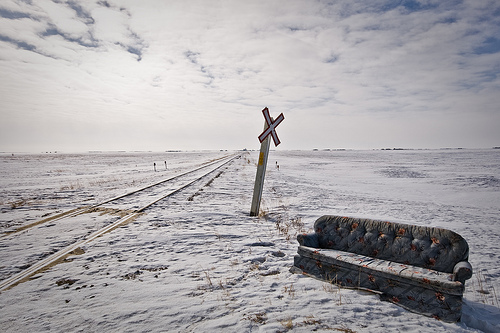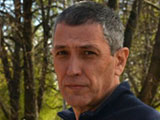Saskatchewan
by Israel Centeno and translated by Kelly Harrison / December 19, 2013 / No comments
Expatriation has another name and place. Israel Centeno found it in Richard Ford’s Canada.

Saskatchewan, 'Prairie Train Station.' Photo: Collin Stumpf via Flickr.
“Loneliness I’ve read, is like being in a long line, waiting to reach the front where it’s promised something good will happen. Only the line never moves, and other people are always coming in ahead of you, and the front, the place where you want to be, is always farther and farther away until you no longer believe it has anything to offer you”
—Canada, Richard Ford.
“Here no one else can gain entry, since this entrance was assigned only to you. I’m now going to close it.”
–“Before the Law”, Franz Kafka
If we were to give a name to the place where the protagonist of Franz Kafka’s The Trial was killed, we’d have to call it Saskatchewan. And if we draw a parallel between Kafka’s novel and Canada, the most recent book by Richard Ford, Kafka’s Josef K would be Ford’s Dell Parsons, an adolescent with a vague idea of his roots, who is systematically flung from one non-place, where he first lives, into the non-place where his voyage of discovery ends.

- From his lonely watch post Albert Camus asked who among us has not experienced exile yet still managed to preserve a spark of fire in their soul. “We’re all alone,” Natalia Sedova cried in exile on hearing of her husband Leon Trotsky’s affair with Frida Kahlo. In his novel Night Watch, Stephen Koch follows the incestuous love affair of David and Harriet, wealthy siblings watching the world from their solitary exile. Koch’s writing, Camus’s theories, and Trotsky’s affair all come back to exile and lead me to reflect on the human condition. From my own vantage point, my Night Watch, I will reflect on my questions of exile, writing, and the human condition.

- Israel Centeno was born in 1958 in Caracas, Venezuela, and currently lives in Pittsburgh as a Writer-in-Residence with City of Asylum/Pittsburgh. He writes both novels and short stories, and also works as an editor and professor of literature. He has published nine books in Venezuela and three in Spain.
Dell Parsons’ initiation—K?—begins the moment his parents are arrested and imprisoned for robbing a bank in rural North Dakota; it ends with his “expatriation” and complicity in the murder of two people. Throughout the novel Dell is involved in an ominous, subtly ridiculous, conspiracy, through the actual forces of inertia are embodied in the character of the hotelier Arthur Remlinger. This all occurs in a place similar to where Dell was living in the US when his parents’ arrest created a crucial turning point in his life. Yet this new place is also different from his home. He resides in a place where he speaks the same language as the locals, yet it’s different; they live the same lives, yet they’re different. It’s as if the action takes place a long way away, even though it seems like Dell has only moved a stone’s throw to the north.
Ultimately, I’m not interested in using Canada as a window to immerse myself in North American literary issues. I don’t expect to have to draw a map of the different narrative voices Dell personifies in a wandering line of space-time through US literary tradition. Consequently, it’s disappointing that his route is not revealed and that the book does not begin with a description of the southern resonances present in the author’s voices, which play with the styles of other authors from the Eastern and Northern US— classic authors that the most shrewd critics have already referenced.
No, my interest in the novel lies in its atmosphere, in the vast space that’s superimposed on the icy autumn, which sweeps across the place where the narrator’s fellow countrymen lay traps, and hunt and gut geese. Having given in to his circumstances, the narrator is incapable of forming a sympathetic bond with the men with whom he shares this country. The cabins in this land are permeated by the body odor of hunters and gamblers who are in the process of harnessing their existential space; the hotel; a dilapidated town; the girls’ correctional facility; all these places attach even more importance to the emptiness in which two other characters who are caught in exile—Arthur Remlinger and the eccentric Charlie—have sought shelter.
I’m approaching Canada in the same way that I’ve approached other novels, searching to give a tangible meaning to banishment and the non-place that pains us as soon as we begin living there.
Expatriation—waking up one morning startled by agoraphobia, sentenced and expelled with no possibility of return—has another name and, why not, another destination: Saskatchewan.




